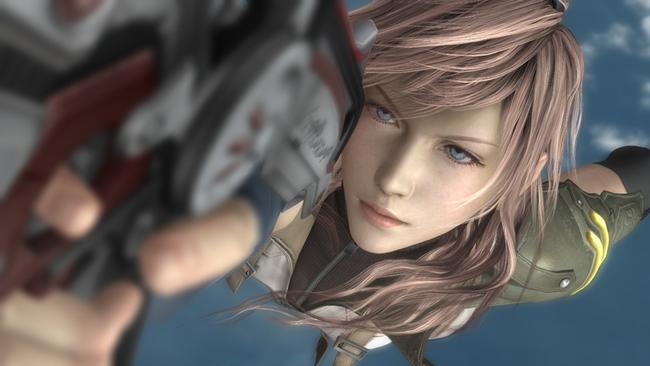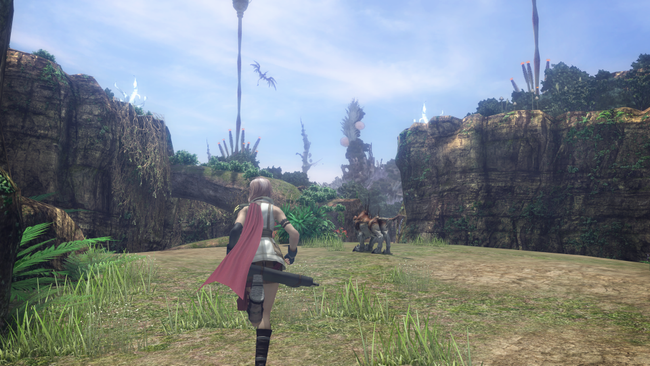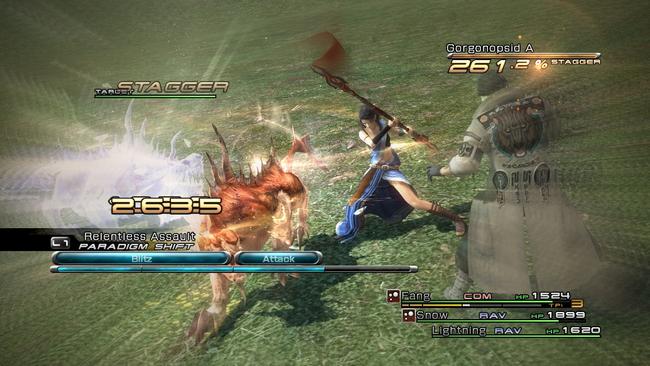
The older it gets, the more I respect Final Fantasy XIII
If you were a fan of role-playing games, the late 2000s and early 2010s were… interesting, right? Indeed, that period has provoked debate this year, after comments from Final Fantasy XVI boss Naoki Yoshida about his distaste for the subgenre definition of ‘JRPG’ - largely because in the 2010’s, the term was often used in a pejorative fashion.
There was a mood back then which sort of suggested that the RPG genre out of Japan had fallen stagnant. Part of this was to do with many Japanese teams, with their custom engines, struggling to adapt to a high definition development pipeline. Part of it probably was down to a little bit of stagnancy. And a huge influence on this opinion was the ‘rise’ of a new breed of Western RPGs on console, heralded by the arrival of things like Mass Effect and Oblivion.
A perfect demonstration of the mood of the time comes from Atlus, which released Grasshopper Manufacture RPG Contact in the West in 2006. Atlus USA splashed big with the rhetoric of the time on the back of the DS title’s box. “Things you WON’T find in Contact,” the box proudly declares – “A guy with spikey hair and/or amnesia. Dramatic monologues. The same battles you’ve been fighting since the 16-bit era.”
This sort of stuff was everywhere back then. As Contact demonstrates, even the publishers of RPGs made in Japan were at it - underlining that their game was different from the genre conventions, because perceived wisdom at the time - at least in the West - was that those genre conventions were looking a bit tired.

All of this is important to note when considering Final Fantasy XIII. This is the environment in which FF13 had its protracted development, and the same environment which had only intensified by the time of its release.
Final Fantasy has always cast a broader net and looked further afield for inspiration than many of its peers. But in this environment, it’s no surprise that such thoughts intensified. Inspiration taken from places that fans didn’t exactly love, rhetoric began to rise.
“In that sense it's more similar to an FPS genre, like Call of Duty,” FF13 director Motomu Toriyama told Kotaku in 2010, referencing the town-free linear nature of FF13. It’s to their credit that in media tours they didn’t sugar coat this: it is the unvarnished truth. That is what the game is. In the years to come, it would be pilloried for it. I’ll hold my hands up: even I made the odd ‘HD Towns are hard’ joke.
At the time, I liked the game well enough but also felt strongly about its shortcomings, including that linearity. At the time, the best descriptor I heard for the game was that it was “a sewage pipe that leads to the ocean”, referring to when the game finally opens up on Gran Pulse.

Hindsight is a hell of a thing, however, and in the years since Final Fantasy XIII, my respect for the decisions its developers made has skyrocketed. In the two Final Fantasy titles since we see both the brilliance and the folly in alternative approaches - and in Final Fantasy VII Remake, we get a more nuanced understanding of what FF13 was trying to accomplish from many of the same development leads.
Looking back on it now, 14 years from its release, I see Final Fantasy XIII as a towering achievement. It’s flawed, make no mistake - but those flaws come from a case of studio-stretching ambition. Final Fantasy XVI has helped to bring this into focus - a clearly expertly scoped game that sets its parameters and stays firmly within them, for good or for ill. By comparison, the thirteenth entry sits with Final Fantasy XV as an experimental, wildly ambitious, glorious mess.
Graceful aging isn’t just about ambition, obviously. Replaying FF13 in the subtly-updated version available in Xbox backwards compatibility (which is by far and away the best version to play now, even over PC), it regularly surprises with visual splendor and tight presentation. The voice direction has a less grounded feel than in later games, but the performances are still great. The cinematography of many scenes continues to stand out, in part because that linear design afforded that sort of focus on the story’s presentation.

One of the best things about the Final Fantasy series is the endless march of change. Both of FF13’s successors are good games in their own right - but each also draws into sharp focus what FF13 did well; what FF13 did better than them. The diversity and clear motivations of FF13’s cast, for instance, really sets itself apart from FF15 and FF16. Of the three games, FF13’s combat remains my favorite, too. It initially looks dangerously boring, but as the game wears on it opens up, unfurling into a strategic delight, drawing you to the edge of your seat as you wait for the perfect moment to trigger a paradigm shift. It feels action packed and yet more precise than FF15’s scrappier brawling; but it’s also steeped in mechanical RPG depth in a way that FF16’s devilish comboing doesn’t. For me, it strikes the balance - it threads the needle.
FF7 Remake also owes so much to FF13 that it’s hard to imagine it existing in its current excellent form without the lessons learned from Lightning’s adventures. In many ways, I consider it the true successor to FF13, over even its two actual iterative sequels.
As art and entertainment alike, video games don’t actually need to be timeless. The true timeless game is rare, even. But that isn’t a negative thing. Final Fantasy XIII is a product of its time - of market and developmental challenges, and of developers who were more experimental and arguably less market-research driven in their approach.
In my original review back in 2010, I quoted Confucius: "Better a diamond with a flaw than a pebble without." This has always fit FF13 perfectly; but as time passes, it feels like it shines ever brighter. It continues to age well - which in many ways is the true test of brilliance.